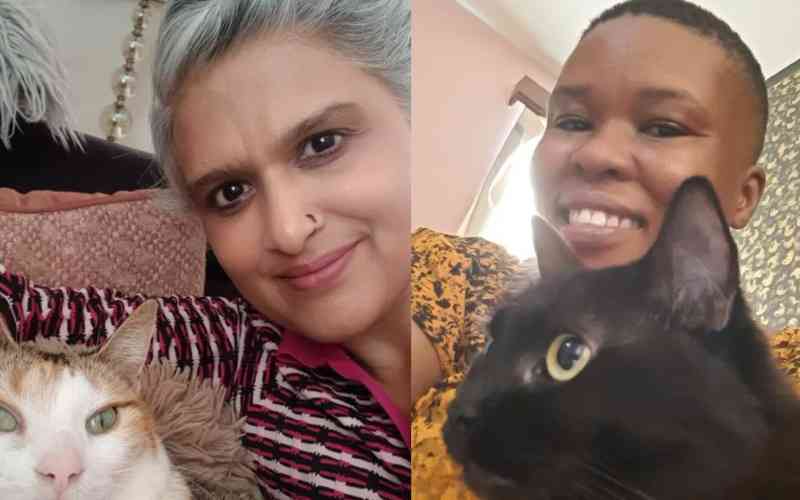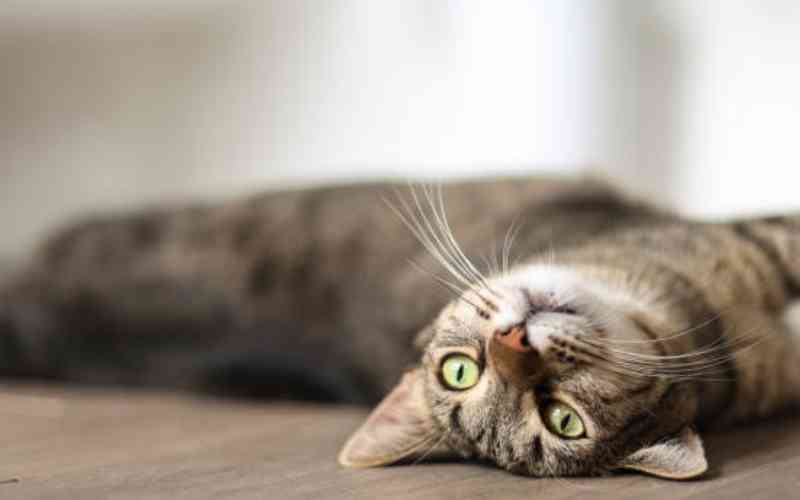
“Until one has loved an animal, a part of one’s soul remains unawakened,” said Anatole France, a French critic.
If that is true, then many people in Kenya are seeing parts of their souls come alive as pets become part of their hearts and families in every way short of being human beings.
Many now refer to themselves as cat mums, cat dads, dog mums and dog dads, referring to their pets as their babies or fur babies. Cat parents also refer to themselves as "cat purrents".
A few keep other kinds of pets as well, such as birds and tortoises.
Sh30,000 a month for cat food
Many people cannot imagine waking up every three hours at night to feed kittens via a syringe, but Saminah Malik has done it many times.
She is a dedicated cat mum and even has a t-shirt that refers to her as one. She has a grown human daughter but she says she loves her cats just as much, as part of her family.
At her house, I am greeted by the sight of several cats along the way as I make my way to the living room. She has 10 of her cats and is fostering four of them.
At one point last year, she had 28 cats in her house, most of them fostered.
One cat wobbles past me. He has Wobbly Cat Syndrome, medically known as cerebellar hypoplasia, an unusual neurological disorder caused by interrupted development of the brain which, in turn, causes spastic or uncoordinated movements.
As I sit down, one cat cautiously eyes me from a distance while another rubs its head against my legs.
I sit next to another one who’s lying in a cat bed, and Saminah tells me the cat can’t walk at all. She is permanently disabled and therefore has to have everything done for her, from feeding to going to the toilet.
“We also put on projector shows for her that she can watch, to keep her mentally stimulated,” she says.
Fostering and keeping cats is hard work, not to mention a fairly expensive venture.
Saminah spends around Sh30,000 on the cats per month, just for food and litter alone. When she had 28 cats in the house, some of them were newborn kittens that she had to wake up to feed with a syringe every three hours – she refers to them as bottle babies.
“Every single room, even the store room had different batches of kittens and I couldn't mix them in case they were carrying some disease. So I had to keep them separate, and I had adult fosters also,” she says.
She says her husband thought she was crazy because in between that, working, doing errands and family commitments, she could not even fit in half an hour to sit down and watch something. She does all this while battling Lupus, meaning she is always in pain.
“That was crazy, but it just feels so fulfilling. It’s just amazing. I don’t think there’s a word that conveys the feeling I get when I know that I raised these babies and they survived and have gone on to good homes. Those people who adopt them still send me updates of how they’re flourishing, the tiredness and sleepless nights all become worth it,” she says.
Cat enthusiast, not parent
Valerie Shaga has also been an avid lover of cats since childhood. She has had several over the years and currently has two of her own. They are fully indoor cats, meaning they never go outside.
However, she does not like the term ‘pet parent’. She prefers ‘cat enthusiast’. Why? For one, as a person who has chosen to be child-free for life, she doesn’t want to be a parent of any kind.
“I’ve never wanted to parent. I just stay with cats because I love cats. Parenting a child is so emotionally involving and intense. The child literally comes before you. I love my cats so much but they are not going to come before me. I’m very invested in their wellbeing but not to my own detriment,” she says.

“But with parenting, raising your child is going to come to the detriment of your desires, your own needs – you’ll have to put so much of what you want aside to take care of children. I’m too lazy to invest that much energy in raising anyone, including cats.”
However, Valerie admits that there can be a lot of similarities, such as when her cat Nala broke her TV and she just had to accept it.
“I didn’t do anything to her. You just learn to live around pets. But I have to say dogs are much more like children than cats,” she says.
They can also be very clingy, just like children. They also have medical requirements and vet bills can be very expensive.
However, when she has a trip she has to drop them off at the vet and while they will miss her, leaving them does not impact them as much as it would children.
On the other hand, while you’ll eventually stop changing a baby’s diaper, Valerie says she will be “knee deep in litter” for the entirety of their lives.
Veterinarians in Nairobi have also noticed the rise of pet parenting, rather than just owning them with little attachment. Boscoh Kimathi, a veterinary surgeon, attributes it to two factors.
“One, the expansion of the Kenyan middle class who have some income to spare to take care of pets. With increased income, they can explore and expand their needs and bring into their lives 'things' that they love and that make them happy,” says Kimathi.
He says that the second factor is that technology has ensured improved exposure, especially to children, who exert pressure on their parents to get them pets like the ones they watch on TV or the internet.
“Many parents succumb to the pressure even when they don't like pets themselves. The impact of this has two faces. One, some animals are lucky and get optimal care from their keepers including access to good food, water, veterinary care, play, and housing and they are loving it,” he says.
He however says that other animals are not as lucky, and the people who own them fail to meet their welfare needs, which could be due to negligence or lack of adequate resources to meet them.
Careful vetting for adoption
This is part of the reason Saminah does not give out the cats she fosters to just anyone. Anyone who wants to adopt the cats has to go through a thorough vetting process and background check.
“I ask for a video of where they live, and if they have a balcony we require them to secure the balcony with chicken wire because cats do fall. We also inform them of all the costs required to cater for a cat and ask if they are able to cater for that and whether there are people in the home with allergies and all that,” she says.
She then has a phone conversation with them, through which she uses her gut instinct to tell if the person is a good person at heart.
They are then invited to meet the cat and see how they interact, and she says that 9 out of 10 times, they are a good match. She also gets a second opinion just to be sure.
Some cats are also better matches for specific people – for instance, not everyone can handle a very energetic cat or one with special needs, while some cats don’t do well with children, who will grab them and then get scratched by the cat.
They also prefer that kittens be adopted in pairs because one kitten will get lonely while the owner is away.
Some people get upset by all the questions she and other foster parents ask before they can hand over the cat, as they deem them unnecessary, and in such cases, Saminah refers them to the Kenya Society for the Protection & Care of Animals (KSPCA) or elsewhere.
While they may love cats, both Saminah and Valerie are both huge advocates of neutering them to prevent them from reproducing.
Anyone who adopts from Saminah also has to commit to neutering the cat when they are of age. Neutering is a surgical procedure performed by a veterinarian to remove the reproductive organs, typically either the testes in males (castration) or the ovaries and uterus in females (spaying).
This is for the good of the pet’s health and of the species in general, according to Kimathi.
“Neutering helps to control animal populations thus ensuring one has the number of animals they can take care of. It has public health benefits as it reduces the number of strays in the streets that act as the medium of spread of diseases such as rabies,” he says.
“Neutering also improves the health and well-being of pets as it eliminates the stress of mating and movement in search of mates for breeding. Neutered animals tend to stay more at home therefore reducing their chances of interacting with others from whom they acquire communicable diseases.”
Another thing that pet lovers highly advocate for is “adopt, don’t shop”. They would rather people adopt pets, rather than buy them. It helps reduce the overpopulation of stays and feral cats and also alleviates the burden on animal shelters, giving more pets a chance at finding loving homes.
It also discourages breeding practices as it reduces the demand for purposefully bred cats, especially from breeders who prioritize profit over the welfare of the animals.
Saminah says that most of these animals are kept in inhumane conditions and neglect, giving the examples of the puppies sold by hawkers on the streets in Westlands, in harsh weather conditions and so on, usually taken to early from their mothers who go mad not knowing what happened to their puppies.
Both Saminah and Valerie dream of a day when all pets will have loving homes. Valerie’s ultimate dream is to be able to travel with her cats.
Saminah, who has fostered hundreds of cats and is in the process of setting up an organisation for the cause says, “You can't get me out of bed on a Sunday morning to go for a jog or to Karura Forest or something. But if somebody calls me and says, ‘Hey, there's a cat in need’, I'll even be out of bed at 6am.”